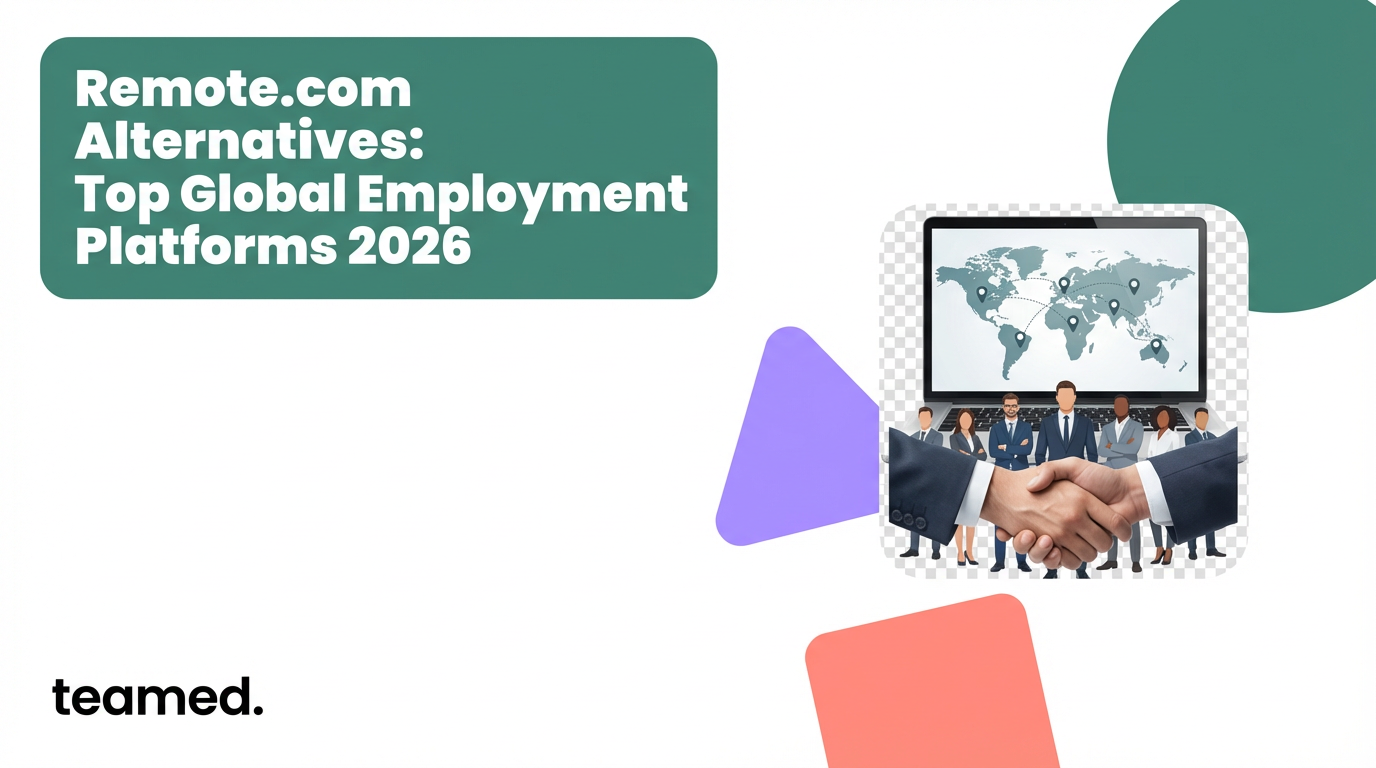In a world where talent is becoming increasingly geographically flexible, companies have more options than ever to diversify their teams. Employees are now craving for the option to work remotely, or at the very least, spend fewer days at the office. But as exciting as this new frontier is, it also brings along its own set of challenges.
Adam Tully, founder of JIE + Search, has some unique insights to share on this evolving landscape. With a laser focus on tech sectors such as SaaS, AI, and Big Data, his agency has been at the forefront of helping venture-backed companies establish their presence in Europe.
In this candid interview, Adam dives into the real-world complexities of international hiring—be it the unique rules each European country plays by, the intricacies of employee compensation across diverse cultures, or why most top talents still prefer full employment. Adam also shares his thoughts on how specialised services and Employer of Record (EOR), like Teamed, solutions can simplify many of these complicated issues.
For companies in the U.S. and Canada eyeing European shores, and vice versa, the challenges are manifold. From the starting points of establishing operations in the UK or Ireland, to understanding what makes top talent tick, Adam's insights provide a much-needed roadmap.
So, grab a cuppa, settle in, and let's delve into what it really takes to build a world-class, global tech team in today's market.
Highlights from Adam
- He unpacks the new landscape of global tech talent—increasingly flexible about location and keen on remote work options.
- Navigating Europe's diverse employment rules can be tricky, but an Employer of Record simplifies this.
- Compensation varies widely by country, setting unique challenges.
- For U.S. and Canadian firms eyeing Europe, the UK and Ireland are common launchpads.
- Top talents still lean toward full employment, making specialised services invaluable.
Full Interview
What’s the main thing you aim to achieve at JIE + Search, and how does this set you apart from other agencies?
I founded JIE +Search 8.5 years ago, after 25 years in tech and executive search. The name "JIE" is an acronym based on my kids' initials, showing the importance of family to me.
I started JIE + Search to work remotely and be closer to them. We specialise in helping venture capital and private equity-backed tech businesses establish a presence in Europe. So we're not a generalist agency; we're laser-focused on tech sectors like SaaS, AI, and Big Data.
What do clients usually want when they aim to hire globally?
In my experience, it's mostly Europe and North America. Companies typically look for salespeople, pre-sales consultants, marketing professionals, and roles in go-to-market functions. The first hire is often a salesperson, especially if the company doesn’t have a European entity yet.
Where do you generally find the best tech talent in Europe?
Traditionally, the UK and Germany have been hotspots. But remote working has opened up other countries like Portugal, France, and Spain.
Talent is becoming more geographically flexible, which is great for companies looking to diversify their teams.
How about European companies hiring globally?
They typically look towards Asia, particularly India, Pakistan, and the Philippines, for tech talent, drawn by the blend of expertise and cost-effectiveness these regions offer.
This search is also extending to Europe itself, with countries like Portugal becoming hotspots due to their growing tech scenes and competitive costs. Similarly, Latin America is on the rise as a tech talent goldmine for European companies looking to expand their global footprint.
Indeed, there's a trend where European firms are now finding top-notch product marketing professionals in the U.S. This mirrors a wider truth: talent has gone global. For example, a European enterprise recently snagged their CRO from the buzzing New York scene.
Moreover, post-COVID migration patterns have seen tech talent disperse across the U.S., with many professionals relocating from the West Coast and embracing remote work, which allows them to work from any location.
Talent is becoming more geographically flexible, which is great for companies looking to diversify their teams.
What motivates tech talent to choose a company today?
Three key factors: financial rewards, the company's market reputation, and workplace flexibility. The last one is increasingly vital. Talent now wants the option to work remotely or only be in the office a couple of days a week.
How do you tackle the challenges of hiring people from different parts of the world?
I faced a situation just yesterday. I was working with an incredibly talented US citizen who's currently in the UK on a sponsored visa.
The main hurdle is navigating changing sponsorship rules, especially after Brexit. Each European country has its own set of rules, and that makes moving talent around a real challenge. As I'm not an immigration or employment lawyer, I usually refer individuals to an immigration service for more specialised help. And, absolutely, an Employer of Record can simplify many of these complex issues.
What's your take on creating employee compensation packages that work across different countries?
That's a tough question. Different countries have different expectations. For example, in Germany, people in commercial roles expect a car allowance, while in the UK, that's often incorporated into the basic salary. In the UK, you're obliged to offer a 3% pension contribution, but that might be scoffed at in some European countries where the benefits are more generous.
I use a document to measure the benefits for each role and adjust accordingly. It's not a one-size-fits-all solution, and there are financial and legal considerations for the employer.
In the UK, you're obliged to offer a 3% pension contribution, but that might be scoffed at in some European countries where the benefits are more generous.
Let's talk about investments in Europe. How's the current situation looking?
Investment trends have seen a shift. Venture capital took a dip at the end of 2021, but it's making a comeback, especially in AI. According to a Crunchbase report, IPO valuations in 2021 dropped by as much as 50%, which is a concern for investors. On the brighter side, the last quarter showed more positive funding news.
And how does this impact hiring strategies?
It's all about risk management now. A few years ago, companies were more like, "What if I miss out?" Now it's, "Will this make money?" You have to be sure your hire is a solid one because a failed hire is costly. So, look at the data, align your hiring plans with your revenue, and ensure you're spending wisely. This way, you'll be in a good position for future funding rounds.
How do European companies tackle challenges with AI compared to their U.S. counterparts?
Five years ago, companies were asking, "What is AI?" Now, they're saying, "We need an AI strategy."
Trust issues still exist, especially with data storage. For instance, some German companies prefer not to store their data in the cloud. Also, work councils in Europe get uneasy when tech could lead to job cuts.
What's your take on AI's impact on job markets?
AI in recruitment has its flaws. I know someone who met all the job requirements but didn't even get an interview.
With more people applying for jobs now, sometimes hundreds per post, AI might be prioritising keywords over actual skills. People are starting to tailor their CVs just to pass these AI filters, which might make the hiring process trickier in the near future.
If U.S. or Canadian companies want to target German-speaking countries, they often face challenges because Germans prefer to speak with Germans.
Researching about how companies from different countries prefer to work with certain other countries. According to your expertise, what’s your opinion?
In my experience, most U.S. and Canadian companies start their European operations in the UK or Ireland. If they want to target German-speaking countries, they often face challenges because Germans prefer to speak with Germans. Since Brexit, hiring Germans in the UK has become difficult.
Companies also try entering different European regions through specific countries: Germany for German-speaking areas, Sweden or Denmark for the Nordics, the Netherlands for Benelux, and France for Southern Europe.
And what about hiring difficulties?
When companies from various countries look into working with overseas partners, they might show preferences for certain countries due to cultural affinities, language commonalities, or economic benefits. However, when it comes to hiring, this approach can sometimes lead to challenges.
The main issue at hand is self-imposed limitations. By only considering a narrow set of countries for recruitment, companies might miss out on discovering the best talent available. It's like fishing in the same pond without realising there's a whole ocean out there. Embracing a wider, more inclusive hiring strategy can unlock the door to a diverse range of skills and experiences. It's about broadening horizons and recognising that the best candidate for the job may not be located within familiar territories.
If a company doesn't have a local entity, they often look for quick contract hires. However, he majority of top talent don't want to be in a contract, they want to be employed. That's where specialised services come in handy.
Why does top talent prefer full-time employment?
Top talent often gravitates towards full employment for several compelling reasons. Primarily, revolving around the sense of security and inclusion it offers. Stability is a major draw, as full-time positions typically provide a consistent work environment and a steady income. This stability extends beyond just financial aspects; it anchors an individual's career trajectory and personal life.
Being part of an organisation as a full employee also fosters a sense of belonging and identity. Employees are not just contributors but become integral parts of the company's fabric, involved in its culture and future. They have ownership over their roles and the space to make a tangible impact on the organisation. This impact is not just through their direct work output but through the ideas they bring, the initiatives they drive, and the culture they help cultivate.
Moreover, full-time employment allows individuals to fully immerse themselves and contribute meaningfully to their organisation’s goals and success. This sense of contribution is often closely tied to personal job satisfaction and professional fulfillment.
On the emotional front, full-time roles address the potential isolation that can come with being a contractor. Unlike contract work, which can sometimes create a sense of detachment, full employment envelops individuals in a community, providing a collective identity and shared purpose that can be deeply fulfilling.
What's Next?
As Adam from JIE + Search pointed out, top talents are increasingly seeking full employment. His agency excels in connecting tech companies from the U.S. and Canada with high-quality talent for European markets. That's precisely where our expertise at Teamed comes into play. Once Adam finds the best talent, no matter where your team is based, your Employer of Record (EOR) makes the global hiring much easier. Whether it's sorting the legalities in different European nations or tailoring compensation packages that hit the sweet spot, we've got your back.
So if you're planning to tap into global talent pools or make a mark on European shores, a partnership with specialists like JIE + Search and Teamed could make your global employment journey smoother than you ever imagined.



-min.png)




